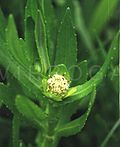Note: This is a project under development. The articles on this wiki are just being initiated and broadly incomplete. You can Help creating new pages.
Enhydra fluctuans
Enydra fluctuans is a perennial herb growing from 30 - 80cm tall. The plant is harvested from the wild for its edible leaves and is also sometimes cultivated in Java, Malaya and Cambodia.
Contents
- 1 Uses
- 2 Parts Used
- 3 Chemical Composition
- 4 Common names
- 5 Properties
- 6 Habit
- 7 Identification
- 8 List of Ayurvedic medicine in which the herb is used
- 9 Where to get the saplings
- 10 Mode of Propagation
- 11 How to plant/cultivate
- 12 Commonly seen growing in areas
- 13 Photo Gallery
- 14 References
- 15 External Links
Uses
[[:Category:Ayurvedic Herbs known to be helpful to treat |]], [[:Category:Ayurvedic Herbs known to be helpful to treat |]], [[:Category:Ayurvedic Herbs known to be helpful to treat |]], [[:Category:Ayurvedic Herbs known to be helpful to treat |]], [[:Category:Ayurvedic Herbs known to be helpful to treat |]], [[:Category:Ayurvedic Herbs known to be helpful to treat |]], [[:Category:Ayurvedic Herbs known to be helpful to treat |]], [[:Category:Ayurvedic Herbs known to be helpful to treat |]], [[:Category:Ayurvedic Herbs known to be helpful to treat |]], [[:Category:Ayurvedic Herbs known to be helpful to treat |]], [[:Category:Ayurvedic Herbs known to be helpful to treat |]].[1]
Parts Used
Chemical Composition
Common names
| Language | Common name |
|---|---|
| Kannada | |
| Hindi | |
| Malayalam | |
| Tamil | |
| Telugu | |
| Marathi | |
| Gujarathi | |
| Punjabi | |
| Kashmiri | |
| Sanskrit | |
| English |
Properties
Reference: Dravya - Substance, Rasa - Taste, Guna - Qualities, Veerya - Potency, Vipaka - Post-digesion effect, Karma - Pharmacological activity, Prabhava - Therepeutics.
Dravya
Rasa
Guna
Veerya
Vipaka
Karma
Prabhava
Habit
Identification
Leaf
| Kind | Shape | Feature |
|---|---|---|
Flower
| Type | Size | Color and composition | Stamen | More information |
|---|---|---|---|---|
| {{{5}}} |
Fruit
| Type | Size | Mass | Appearance | Seeds | More information |
|---|---|---|---|---|---|
Other features
List of Ayurvedic medicine in which the herb is used
Where to get the saplings
Mode of Propagation
How to plant/cultivate
Commonly seen growing in areas
Swamps areas, Aquatic areas, Coastal regions, Marshes, Streamsides.
Photo Gallery
References
External Links
- [ ]
- [ ]
- [ ]
- Ayurvedic Herbs known to be helpful to treat
- Herbs with Stems used in medicine
- Herbs with Leaves used in medicine
- Habit - Perennial
- Index of Plants which can be propagated by Seeds
- Herbs that are commonly seen in the region of Swamps areas
- Herbs that are commonly seen in the region of Aquatic areas
- Herbs that are commonly seen in the region of Coastal regions
- Herbs that are commonly seen in the region of Marshes
- Herbs that are commonly seen in the region of Streamsides
- Herbs
- Pages without herbs images



